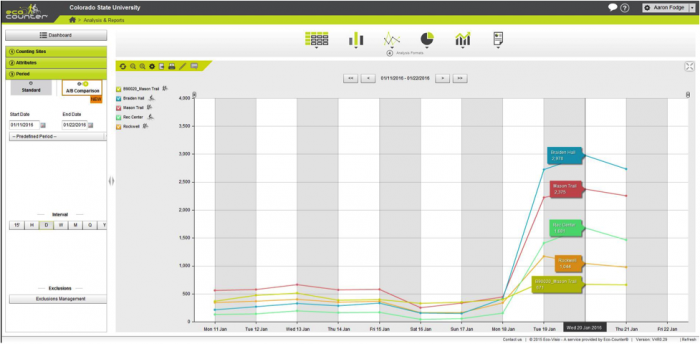Colorado State University wants to take credit for all our bicyclists. Doesn’t matter if you are heading to class or enjoying the cut through campus. We want to know our bicycle trails are serving the needs of the campus and community.
At CSU, our Bicycle Master Plan included a recommended placement of bicycle counters to help us learn about bicycle participation, peak times, and the effect of weather events.
There are a number of methods for counting bicycles that include lasers, people with clipboards in lounge chairs to our selected Eco-Counters. Eco-Counters can count bicycles in 15-minute intervals along with the direction the bicycle is traveling 24 hours per day. The counter is activated when the metal in the wheel comes in proximity to an inductive loop in the concrete. They can also count pedestrians with the use of an optical device.
Here is a graph showing the four counters on campus:

This graph depicts the days leading up to the first day of classes in the Spring Semester (2016) on January 20th. Each count recorded daily trips (both directions) below 500 until the first day of classes when counts jump from around 1000 – 2500 per counter.
You can see the impact our students have one our trails when class is in session. The spike in bikes, even in the depths of winter, is astounding. You can imagine if these bicyclist had instead chosen to drive a personal vehicle the impact they would have on congestion in the streets surrounding campus.
CSU has aspirations to purchase four more permanent counters in the next year. We hope to pair these counts on trails with temporary counts on some of our streets. CDOT and the North Front Range Metropolitan Planning Organization now have counters that can be loaned out through the member municipalities.
These counts are essential to justifying the investment in bicycle trails. It is so difficult to argue for bicycle infrastructure with arguments like, “There are LOTS of people riding” or “I never see bikes there” when you could pull data to say, “We see 20 bikes per hour during the workday, 40 on the weekend.” CSU is happy to share our data should it help our colleagues justify their projects.
So, ride through and be counted. CSU hopes the community will embrace our bicycle trails to get you where you are going.
Aaron Fodge is the Alternative Transportation Manager at Colorado State University. He currently serves on the board of the Association for Commuter Transportation and the Pacific Intermountain Parking and Transportation Association.
